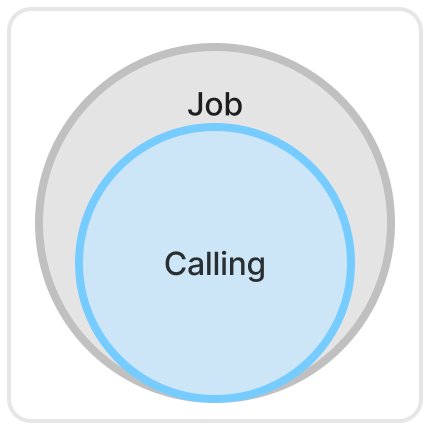I think many people feel lost in their careers because they conflate their “job” with their “calling”.
Your job is work you do to pay the bills. It's work that you probably wouldn’t do if you weren't paid for it.
Your calling is work you do because you feel a deep personal and emotional connection to it. It's work that you’d do even if you made no money and got no recognition for it.
In a picture, the distinction looks like this:
When we feel lost at work, it’s natural to think that the solution is shifting from the “job” quadrant toward the “calling” quadrant. This is the embodiment of the “do what you love and you'll never work a day in your life” dream. It’s seductive: merge what you love with what pays the bills and voilà - you’ve made it!
I’ve definitely fallen for the belief that for my career to be meaningful, it has to coincide perfectly with a passion or calling. One of the most liberating things I’ve come to accept in the past few years is that there are multiple ways of finding meaning at work and not all of them require your job and calling to be identical. So, in this piece, I want to explore different options to relate to your work.
Before we get started, a few things to note
When I speak about a “job”, I'm not thinking of someone in a job they hate. There's no evil boss bullying you and making you work overtime without compensation (if you're in that situation, please consider leaving) I'm thinking of someone who feels lukewarm about their job - colleagues are decent, pay is decent, boss/manager is fine - yet feels stuck or lost because it’s not what they “truly” want to do. This is probably what I felt back in my academia days.
I’m using the term “calling” somewhat loosely. It's an interesting word: it's a verb rather than a noun and it’s unclear who’s doing the “calling” - God? Nature? Your soul? Use whatever metaphor resonates with you. The point is that there's some inner pull, some inexplicable power calling you toward certain work.1
The idea of being called to do something can seem airy-fairy, associated with people at the top of their game (great musicians, painters etc). If you don’t feel a strong pull toward something, don’t worry. Just think of “calling” as anything that you’d pursue even without external rewards. Callings don't have to be world-changing; they just need to resonate with who you are.
Anyhow, the three approaches of relating to work that I want to discuss are:
The full alignment approach, where job and calling are one and the same
The partial alignment strategy, finding elements of meaning within any job
The side calling approach, deliberately separating job from calling
I. The Full Alignment Approach (Job = Calling)
Full alignment between your job and calling happens when you make money from your calling. Roger Federer's calling and job were one and the same: tennis. Lin-Manuel Miranda gets paid handsomely to write the music he'd probably create even without pay. Researchers who are genuinely passionate about their field get funded to answer questions they're extremely curious about.
From an external perspective, this alignment looks magical. You’re getting paid to do what you'd do anyway. So your work doesn’t feel like “work” in the traditional sense of the word.
But I think for most people, expecting our jobs to provide us with a good income, as well as meaning, purpose, identity is setting a very high bar. Jobs exist not to meet our deepest needs for meaning and purpose - they exist to solve market problems. The meaning has to be created by us, but not necessarily from the job.
It’s only in recent decades that we’ve become more demanding about what a job should give us. If I were to ask my grandfather, who migrated from China to Malaysia in the 1950s and restarted his life on a timber farm, whether that was his calling, he wouldn't understand the question. And if any of his grandkids were to explain why they've quit a stable 9-5 to pursue a “calling”, he also wouldn't understand it. Fair enough.2
And it’s only when we get older that we become more demanding about what a job should give us. As teenagers (and even in our early 20s), we’re usually very clear about the distinction between job and calling. We waitress at local cafes, tutor maths, babysit not because we felt called to do so but because we had extra time and wanted extra cash. The transaction is clear: time and labor exchanged for cash.
I'm not saying that it’s bad to align your job and your calling; it’s great if you can! But there are not that many Roger Federers and Lin-Manuel Mirandas between us.
What I'm saying is that your job doesn't have to be your identity or your purpose. You most definitely haven't failed if your job doesn't feel like your calling.
The most reasonable thing to expect from your job is that you enjoy it, you get to learn, and that you're fairly compensated for your time and skills. Sometimes that is enough.
II. The Partial Alignment Approach (Parts of job = Calling)
Jobs aren’t monolithic. A job is a bundle of tasks, roles, and responsibilities. Some of these tasks and roles might align more with your calling, others not.
Partial alignment means identifying elements of your job that already do or could align with your calling and then looking for opportunities to expand them. Alternatively, it could also involve identifying non-aligned tasks and finding a way to reduce or reframe them so they become more aligned.
Recognizing that jobs can be broken down into tasks and roles frees you from the binary thinking that your work must either be your calling/passion or “just a job”.
III. The Side Calling Approach (Job ≠ Calling)
The side calling approach is where your job provides financial stability (and maybe other benefits like professional development) while your calling is pursued outside of work on your own terms and timeline. You don’t expect your job to provide you with meaning and purpose. If anything, you create clear boundaries between these domains.
I think this approach makes a lot of sense and doesn’t get the respect and attention it deserves. In particular, it makes a lot of sense for callings that don’t have a direct relation to “conventional” office jobs - music, surfing, rock-climbing, painting.
At a yoga and philosophy retreat I went to recently, I met many people who fall into this camp. One attendee has been working in real estate for 14 years. When I remarked that they must enjoy it if they’ve stuck to it for over a decade, their response was:
“It's just a job for me. But it gives me the financial opportunity to go on retreats like this multiple times a year, travel to Goa, learn yoga and philosophy, which is what I feel called to do these days.”
It's easy to interpret the side calling approach as “settling” for a job. But as long as it's a job that meets your requirements (e.g. you find the work enjoyable, your colleagues are decent, and you're compensated fairly), this separation can be a deliberate choice that leads to a rich and balanced life where your financial needs and deeper purpose are fulfilled - just not through the same activities.
Also, when your livelihood doesn’t depend on your calling, you have more freedom to explore and play without financial and reputational concerns. Wallace Stevens was one of America's greatest poets, but he worked in an insurance firm for most of his life. His poetry remained unburdened by commercial demands.
The biggest challenge with the side-calling approach is finding time for your calling alongside your job. Without full-time hours to devote to your calling, a lot of it comes down to time management and community building. Progress may be slower. But slow doesn't mean less meaningful.
~~~
Too often, we hold up full alignment as the ideal to aim for, but there isn't one correct way to relate to your work.
If you are one of the rare few whose job is your calling, count your lucky stars. If you’re not one of those people, it doesn't mean you're lost in your career or that your job isn't serving you.
Give yourself the permission and patience to find what works best, without the pressure to figure it all out.
Ines
The inexplicability is part of its beauty. We can’t fully explain why Beethoven was “called” to dedicate his life to music or why Jane Goodall was drawn to studying chimpanzees. They just were. It was an expression of who they were.
It's also worth remembering that perfect alignment is rare. Even people who appear to have their dream jobs deal with aspects that don't align with their calling.
When I think of my current boss, Ali Abdaal, it might seem like he's the perfect embodiment of the full-alignment approach. I think he'd say that his “calling” is to teach people valuable skills so they can build lives they love. His job includes creating educational content online, but also includes filming sponsorship segments, leading a team, analyzing company finances etc. The teaching aspects directly fulfill his calling. But he doesn't enjoy some of the other components - they're simply necessary components of making his work sustainable.
Similarly, a doctor's calling might be healing patients, but their job includes insurance paperwork and hospital politics. A teacher's calling might be mentoring young people, but their job most likely includes administrative tasks. A chef's calling might be creating dishes that give their diners a stunning culinary experience, but their job includes managing kitchen inventory and scheduling (or so I've seen from the TV show The Bear).








Partial Alignment approach is what I've been aiming to do! Thanks for giving me the name lol. I'm in college, studying a career not related to my passion, but I'm still trying to figure out how to mix the two. They're both on the creative side, so it might not be too hard in the end.
Wow this is a really clear way to think about the thing(s) that we do for money. When I got my first job as a reporter, I mistook it to be my calling and I felt really miserable. This mindset shift would have been really helpful for 22-yo Becky.
P.S. Should have clocked that you're a LMM fan!